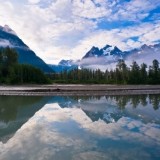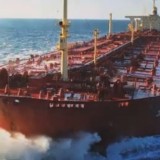Last article I spoke of civil disobedience, a legitimate tool of dissent in a democracy when a government makes political decisions without public consultation and to the exclusion of all but the powerful. We have just such a decision forthcoming with federal and provincial approval of the Enbridge pipelines from the Tar Sands to Kitimat and huge oil tankers moving that sludge down our treacherous coastline to Asia and the US.
The governments will no doubt say that this decision has been democratically decided by democratic process, which is pure barnyard droppings.
In fact the public has not been consulted and won’t be until after the deal is done.
Since last week there have been two major events to report.
Stephen Harper will likely face five vacancies on the Supreme Court during this term – including two recent retirements and others on the way – which he will fill with Conservatives, thus ensuring “right thinking” dominance of that court for more than a decade to come.
Harper is good on political pay-offs. Look at how he rewarded David Johnston, whose terms of reference for the hearing into the investigation into Brian Mulroney’s shenanigans ensured that he would get off lightly and no nasty reflections on the Conservative Party would surface. Mr. Johnston was rewarded by appointment as Governor-General.
The second event was Harper confirming that his government will approve the massive oil tanker traffic to come down our coast from the Enbridge pipeline delivering Tar Sands bitumen to Kitimat. Displaying breathtaking candour, combining arrogance and ignorance, Harper approved this deadly policy saying that tankers already go down the Atlantic coast and are widely used in the Great Lakes! That shows you how much Harper and Co. knows about BC and indicates to me how unimportant our local Tory MPs are or, perhaps, they aren’t able to understand what BC is all about. About one thing we can be certain: no environmental concern will ever even slow down any moneymaking scheme of those who care only for money. Corporations don’t have a soul because they’re not supposed to; the government has no soul because they rely on corporate money to stay elected, while the people who do possess souls are stonewalled from standing up for real values.
There are also the fish farms which Harper, through his Minister, Gail Shea (easily the worst Fisheries minister ever, and that covers a lot of ground) actively uses Fisheries and Oceans as an advertising agency for these environmental nightmares.
I hope I’ve demonstrated why we cannot rely upon democratic processes to save our environment.
Last Saturday’s Globe and Mail had a full page story by Josh Wingrove in their national edition. It chronicles recent oil spills, especially the Rainbow disaster – the largest spill in Alberta in more than 30 years. My advice is to get that article, download it off the Globe and Mail website for the entire story.
The truth is that spills cannot be avoided and when they happen are utter disasters.
It’s not hard to understand why this is so. It takes time for a spill to become evident and when it does, huge damage has already been done. You can stop the oil being transported but you can’t do anything about what is already in the pipe.
It’s important to understand where the two Enbridge pipelines will go and it must be remembered that we’re dealing with two pipelines – one to bring the bitumen to Kitimat and one to take the gas condensate to Alberta, in order to dilute the bitumen to be transferred.
It must be carefully noted that we’re not talking about “risk” here, but a certainty. It’s as simple as this – if one runs a “risk” continuously it becomes a reality waiting to happen and when it does happen it’s a first class calamity.
The Enbridge proposed pipeline runs through one of the last true wildlife areas in the world – 1000+ km and over 1000 rivers and streams.
The catastrophe can come from several possible sources – earth tremors, aging and rusting, terrorism, and plain negligent construction. The Rainbow disaster came because a small section of the pipe was not sufficiently buttressed against the earth settling – a simple but catastrophic event caused by one shift in one minute area of the pipeline.
How can these be inspected?
The short answer is they can’t be, as the Rainbow case makes eloquently clear. They are largely located far away from populations and hard to get at. Moreover, as in the Rainbow case, the problem is seldom discernible to routine inspection.
In summary, the proposed pipeline from the Tar Sands will fail, and when it does it will be a catastrophe of epochal proportions.
What then of the tanker traffic down our treacherous coast?
A wreck or serious leak is even more dangerous than a pipeline leak and will make the Exxon Valdez pale into insignificance. Moreover it will happen and, when addressing this point, remember that at least pipelines stay still.
What an irony – here we are trying to wean ourselves off fossil fuels while we sacrifice our land and water on behalf of Asian customers after our fossil fuels!
And bear this in mind: BC gets nothing out of all out of all this – we’re and easement, a right-of-way to suffer consequent damage from pipelines we have no interest in.
Don’t be fooled into thinking that jobs come with this exercise. Once the pipeline is built, the only labour is custodial. Even most of the construction jobs will go to those who do this sort of work on an ongoing basis and will almost all come from out-of-province.
What remedies are there for us to pursue?
Write a letter to our MP?
Mine gave money to Plutonic Power (General Electric in drag), without the remotest idea as to what this independent power company was doing or even a faint notion of what the provincial government’s Energy Plan was all about. Why would he be any more caring about oil spills on land and sea?
There are no remedies within the system and any attempts to proceed down that path are an utter waste of time.
Our only hope is to protest and, if necessary, practice civil disobedience with the expectation that the rotten justice system will put us in jail.
That tells you what democracy, Canada-style, is all about.






